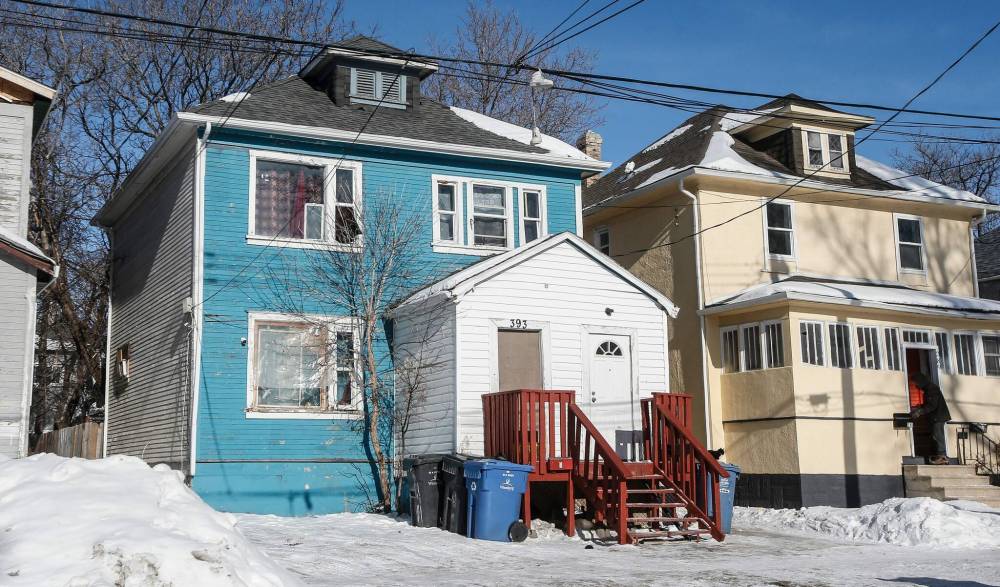North End tip line to battle plague of violence, drugs
Advertisement
Read this article for free:
or
Already have an account? Log in here »
To continue reading, please subscribe:
Monthly Digital Subscription
$0 for the first 4 weeks*
- Enjoy unlimited reading on winnipegfreepress.com
- Read the E-Edition, our digital replica newspaper
- Access News Break, our award-winning app
- Play interactive puzzles
*No charge for 4 weeks then price increases to the regular rate of $19.00 plus GST every four weeks. Offer available to new and qualified returning subscribers only. Cancel any time.
Monthly Digital Subscription
$4.75/week*
- Enjoy unlimited reading on winnipegfreepress.com
- Read the E-Edition, our digital replica newspaper
- Access News Break, our award-winning app
- Play interactive puzzles
*Billed as $19 plus GST every four weeks. Cancel any time.
To continue reading, please subscribe:
Add Free Press access to your Brandon Sun subscription for only an additional
$1 for the first 4 weeks*
*Your next subscription payment will increase by $1.00 and you will be charged $16.99 plus GST for four weeks. After four weeks, your payment will increase to $23.99 plus GST every four weeks.
Read unlimited articles for free today:
or
Already have an account? Log in here »
Hey there, time traveller!
This article was published 19/02/2025 (293 days ago), so information in it may no longer be current.
Residents of a North End neighbourhood under siege from drug dens and violence — including a weekend double homicide — are working to set up an anonymous tip line in an effort to deal with the problem.
The “Power Line” would give people in the area a way to report suspicious activity and support law enforcement without identifying themselves.
“There’s a big concern in the community,” said Darrell Warren, president of the community’s association, who applied for provincial funding through the Criminal Property Forfeiture Fund.

JOHN WOODS / FREE PRESS
Neighbours reported suspicious activity around the Alfred Avenue house at the centre of a double homicide.
“The biggest problem in this area is people don’t want their names to slip to these criminals that they’re the ones reporting it.”
The renewed push for the tip line, which would funnel calls to the association and then on to police, comes after Sheldon Derrach Catcheway, 33, and Shanastene Irene McLeod, 35, were gunned down at a home in the 300 block of Alfred Avenue early Saturday.
No arrests have been made in the case, police said Tuesday.
The duplex home just east of Salter Street is known to police, and several neighbours told the Free Press of frequent drug-related and other suspicious activity there.
The residents feel powerless and unsafe approaching specific homeowners or their occupants.
“You’re taking a chance that there will be repercussions,” Warren said. “That’s the trouble with my area: the problems don’t get solved.”
The beleaguered William Whyte neighbourhood — bounded by Redwood Avenue to the north, Selkirk Avenue to the south and Arlington and Main streets to the west and east, respectively — is the city’s most violent, according to the Winnipeg Police Service’s 2023 statistical report. It shows 1,000 more instances of violent crime there than in Daniel McIntyre, which is next on the list.
While violent crime fell 4.1 per cent from 2022 levels in William Whyte, the five-year average remained statistically unchanged.
Drug activity, which William Whyte also tops, shot up 23.1 per cent in 2023, although it remains down 25.2 per cent versus the five-year average.
Warren said he hopes the tip line can have the same impact in his neighbourhood as it had in another inner-city community years ago.
Set up nearly two decades ago, the first “Power Line” worked wonders for North Point Douglas, neighbourhood activist Sel Burrows said Tuesday.
Like William Whyte now, North Point Douglas was once seen as one of Winnipeg’s most dangerous communities, with the highest crime density in the city.
“We really focused on drug dealers and worked to get drug dealers evicted quite quickly… and it was really quite amazing the change in the community,” said Burrows, who ran the tip line long before it could be funded through forfeitures.
He said criminals learn quickly what they can and can’t get away with.
“There are simple and really low-cost things that can be done,” he said.
Burrows said he’s been working with the William Whyte association to help members achieve the same result.
“The problem in the inner city is we use the jail system so heavily with our Indigenous community that ‘no ratting, no squealing’ has become a value that people carry with them,” he said.
“One of the biggest things we did in Point Douglas was put a flyer out every couple of months, and it would say, ‘No ratting, no squealing is jail culture. You have a right to defend your turf.’
“Over half the calls I would get from these flyers were from young Indigenous mothers who wanted to protect their kids. We were able to change that culture.”
The Criminal Property Forfeiture Act provides funding to law enforcement agencies for crime reduction or prevention initiatives, a provincial spokesperson said.
“Law enforcement agencies may, in turn, sponsor a community organization to assist in this mandate and submit a Criminal Property Forfeiture Fund application on behalf of the community organization,” the spokesman said.
Funding for community crime prevention initiatives may also be made available through the Federal Proceeds of Crime Fund, which is generated from forfeitures made via prosecution of federal offences in Manitoba.
Mynarski Coun. Ross Eadie, whose ward includes William Whyte, said he’d be in favour of the tip line, having seen its success in North Point Douglas.
He said the flyers Burrows distributed helped ensure the option to report through the line was always in front of people.
Eadie, who’s received calls to his office about trouble spots in the community, said he’s wary of the potential barrier to reporting police involvement could have on those who mistrust law enforcement.
“The beauty of the ‘Power Line’ is that the police aren’t coming to your house to talk to you,” he said. “It really helps, because you’re pounding back at the criminal activity. I hope they succeed and have something to move ahead with.”
scott.billeck@freepress.mb.ca

Scott Billeck is a general assignment reporter for the Free Press. A Creative Communications graduate from Red River College, Scott has more than a decade’s worth of experience covering hockey, football and global pandemics. He joined the Free Press in 2024. Read more about Scott.
Every piece of reporting Scott produces is reviewed by an editing team before it is posted online or published in print — part of the Free Press‘s tradition, since 1872, of producing reliable independent journalism. Read more about Free Press’s history and mandate, and learn how our newsroom operates.
Our newsroom depends on a growing audience of readers to power our journalism. If you are not a paid reader, please consider becoming a subscriber.
Our newsroom depends on its audience of readers to power our journalism. Thank you for your support.











